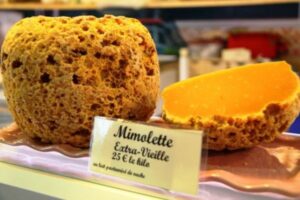The 411 on Mimolette and the Ban

You may have seen the pictures of the New York protest featuring people dresed up in orange, passing out samples of bright orange cheese… but do you know what it’s really about? The rumored ban on mimolette cheese in America is a complicated affair, so it’s time to set the record straight.
What is Mimolette?
Mimolette is a bright orange cheese made in the north of France as well as in several neighboring regions to the north, in Belgium and in the Netherlands. It was once the favorite cheese of Charles de Gaulle, the French president who declared his country ungovernable due to the sheer number of cheeses that it produced.
Mimolette is bright orange in color, with a nutty, almost sweet flavor. Some afficionados like pairing pieces of the aged cheese with sugar, for a sweet-and-salty combination.
Several varieties of mimolette exist, including one that is aged several months. Part of the aging process of the cheese includes the introduction of microscopic cheese mites, which are located in the pockmarked rind, similar to canteloupe skin in texture and appearance, and traditionally discarded before consumption.
The Facts
The cheese has been temporarily blocked from entering the United States, though the ban itself is far from official. Concerns that the mites used to make the cheese could cause allergies caused the FDA to put away over a half a ton of the cheese in New Jersey, a blockade that has people in an uproar.
The truth of the matter is that the process has been used for centuries to give mimolette its familiar flavor and appearance, and it has not posed allergy problems in the past. The FDA has cited an increased number of the mites as the reason for this particular ban.
The block on mimolette importation is just part of a larger ban of several raw milk cheeses that the FDA has deemed not fit for consumption. Considering what constitutes American cheese in this country, proponents of natural cheese are outraged.
Save the Mimolette
The block on mimolette has outraged American cheese lovers, who, in addition to in-person protests, have flocked to Facebook to create the Save the Mimolette project. As for the future of the French cheese, nothing is certain. Because it is aged more than 60 days, aged mimolette, much like aged parmesan, should be one of the raw milk cheeses allowed in the States. However, the organisms on the outer rind may add mimolette to the host of other foods that are banned in the States and throughout the world.

